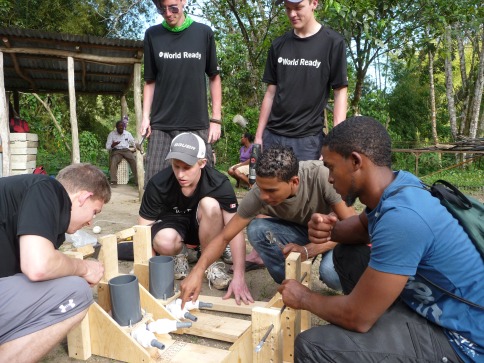
Don’t tell Bill MacDonald, or any of the 15 students who returned from their International Field Studies trip to the Dominican Republic with treadle pumps in tow, that their experience is over. To them, it’s only just begun.
The Environment and Horticulture professor led students on a 10-day trip over Reading Week with his wife Linda, a lab technologist at the Welland Campus. While a 10-day cultural experience is what they signed up for, their desire to help others has turned it into so much more.
It all began when they decided to construct two treadle pumps to aid the developing greenhouse industry in the Dominican Republic. MacDonald had read about the simple foot-powered pumps resembling makeshift elliptical machines that have been used in developing countries, and thought it could benefit those aiming to grow produce in the Los Cacaos region they would be visiting. The treadle pumps seemed like a good fit for the area where power such as electricity or gas is cost prohibitive.
Students embraced the idea and, eager to make a difference, learned to build the treadle pumps on weekends before they departed for the trip.
To say the treadle pumps were well received in the Dominican Republic would be an understatement.
Craig Koornneef, who is also in the Greenhouse Technician program and helped in the assembly of the treadle pumps in the Dominican, said the reaction of the local people when they first saw one working took him by surprise.
“Their jaws just dropped. They couldn’t believe it. Just seeing the water dripping out of the hose, they were as excited as little kids with candy,” he said. “I was shocked that something so small could make such a big difference.”
Once one of the treadle pumps had been assembled, Greenhouse Technician student Andrea Sanchez witnessed a dramatic scene: a group of locals kneeling down and praying around it. Sanchez, who is from Colombia and fluent in Spanish, could understand their prayers as they thanked God for the treadle pumps and the NC group who brought them.
“They are Catholic and very religious people and believe that whatever comes to them and improves their life is a gift from God,” she said. “It was very emotional and very rewarding to see that.”
MacDonald was very moved by the response of the local people. He noted how not even he had imagined how well they would be received and how the treadle pumps would be such a perfect fit for their needs.
“To us, drip irrigation is 40 or 50 year old technology but for them, it was just phenomenal and just what they needed,” he said. “This has made such a great impact. The beauty of it is that it’s such a simple thing that makes such a big difference.”
After the students on the trip assembled the first treadle pump, they assembled the second one together with the local people, training them how to do it as photos were taken to record every step of the way.
Witnessing the impacts of their efforts has left the entire group with a desire to do more. Not only do they plan to continue to bring treadle pumps to the area on future International Field Studies trips, they plan to establish a NGO to continue their efforts in the Dominican Republic and perhaps to other developing countries. They would like to put together kits for treadle pumps as well as for small, 150-square-meter greenhouse structures that would enable individual families to grow produce for their own consumption and to sell. The kits would also include compost teas that help control disease on crops.
The NGO would allow all students who went on the IFS trip to continue their involvement – even after some of them graduate this spring. MacDonald is hoping some of the graduating students will take leadership roles to mentor new students on future trips. The NGO would also allow students, who come from a variety of programs, to bring their various skills to the table on the project.
Ashlyn Berkhout, who is in the General Business program, is looking forward to helping with the business aspect. She found it a very rewarding experience that was making history in the Dominican Republic.
“They don’t have anything like this over there, so being able to give something to help with irrigation when they don’t have the power to run huge machinery, and something eco friendly as well is pretty awesome,” she said. “I’m only in my first year and I’m already learning so much. We all want to keep going on with this.”
Hejia Liu, an International Commerce student from China, was also looking forward to continuing her involvement. She found the experience highly rewarding and in more ways than she had anticipated. She not only made new friends and became exposed to new cultures – from Canada and the Dominican Republic –but it helped boost her communication skills which are essential to international business culture.
“I never thought that one trip could change me so much,” she said.



